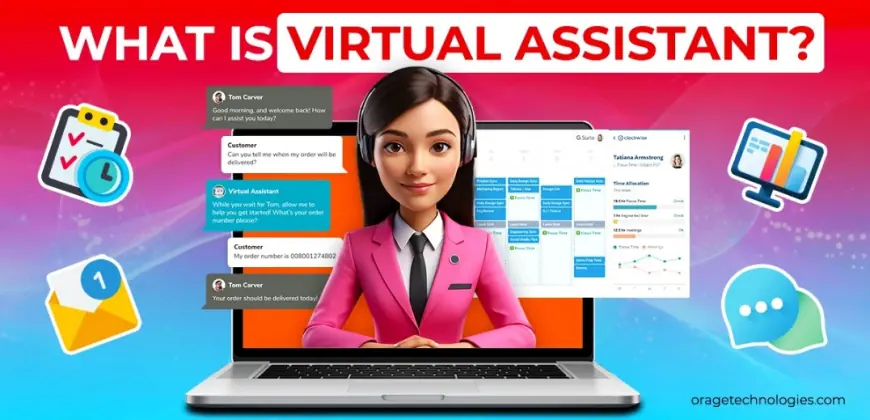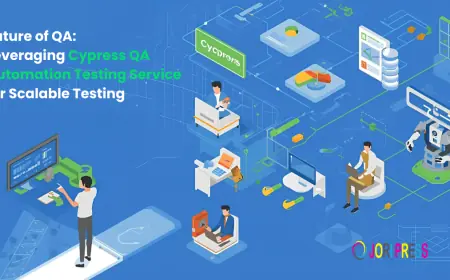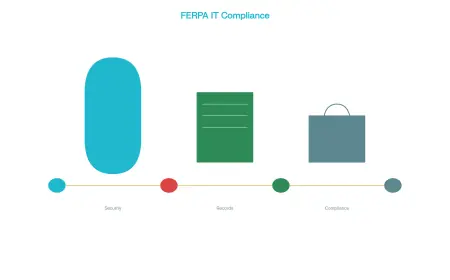What is a Virtual Assistant and How to Become a Virtual Assistant
Discover what a virtual assistant does and learn how to become virtual assistant in 2025. Step-by-step guide, skills needed, tools, job platforms, and income tips.

In the digitally-reliant world of today, the remote work philosophy has revolutionized the conventional workplace. Among the most coveted professions in this shift is that of a Virtual Assistant (VA). Flexible, scalable, and ever-more integral to business, virtual assistants are the pillars of myriad businesses worldwide. So just what does the job of a virtual assistant look like? And more importantly, how do you become virtual assistant and establish a successful remote career?
In this full tutorial, we will discuss what is a virtual assistant, the services they offer, the qualifications required, where to look for jobs, and a step-by-step plan that will assist you in successfully becoming a virtual assistant in 2025 and beyond.
What is a Virtual Assistant?
A virtual assistant is a distant professional who renders an array of services to businesses, entrepreneurs, or busy professionals. Unlike an in-office assistant, a VA works from a home office or a remote setting. Their work varies extensively—from email and calendar management to customer service, social media management, content creation, bookkeeping, and more.
Virtual assistants could work part-time, full-time, freelance, or on a contractual basis, providing convenience to both the client and VA. With an increasing number of firms adopting remote working and outsourcing, the demand for professional virtual assistants is rising.
Why Virtual Assistants Are in Demand
There are numerous reasons why the demand for virtual assistants is increasing:
-
Cost-Effectiveness: Employing a VA saves money on office space, equipment, and employee benefits.
-
Time Management: Entrepreneurs and businesses can delegate time-consuming tasks and focus on core activities.
-
Global Access to Talent: Clients can choose from a wide range of skilled VAs from different time zones and backgrounds.
-
Remote Work Trends: The rise of freelancing, remote teams, and gig economy platforms has normalized virtual assistance.
This great demand presents a perfect time to become virtual assistant, particularly for individuals looking for location independence, flexible schedules, and a rewarding online career.
What Does a Virtual Assistant Do?
The tasks of a virtual assistant can change depending on the industry, client requirements, and the skill set of the VA. Here are typical functions performed by virtual assistants:
1. Administrative Support
-
Email and calendar management
-
Meeting and appointment scheduling
-
Data entry and file management
-
Travel arrangements
2. Customer Service
-
Answering customer queries
-
Handling CRM software
-
Processing orders and returns
3. Social Media Management
-
Preparing and scheduling posts
-
Addressing followers
-
Publishing ad campaigns
4. Content Creation
-
Writing articles and blog posts
-
Creating graphics and presentations
-
Editing and proofreading
5. Bookkeeping
-
Handling invoices and expenditure
-
Monitoring payments and financials
6. Technical Support
-
Updating websites
-
Installing automation tools
-
Fixing software problems
If you wish to become a virtual assistant, it is helpful to know your strengths and determine which services you like to provide.
Who Can Be a Virtual Assistant?
One of the best things about this career is its availability. Nearly anyone with a stable internet connection, effective communication skills, and a willingness to learn can be virtual assistant.
Ideal Candidates are:
-
Stay-at-home parents
-
Freelancers who want to diversify services
-
Recent graduates
-
Retirees seeking part-time employment
-
Individuals who are transitioning from regular office jobs
Even without experience, you can be virtual assistant by acquiring the relevant skills and promoting yourself properly.
Key Skills to Become Virtual Assistant
While formal training is not essential, there are some soft and hard skills required if you wish to succeed in this profession. Below are the main competencies you will need to become virtual assistant successfully:
Communication Skills
Timely and clear communication—written or spoken—is key. You will probably be communicating through email, chat, video conferencing, and project management software.
Time Management
Handling multiple clients and deadlines is a common aspect of a VA's life. Proper time management guarantees tasks are completed on time.
Technical Competence
You will be using a variety of tools such as:
-
Google Workspace or Microsoft Office
-
Trello, Asana, or ClickUp (task management)
-
Slack or Zoom (communications)
-
Canva or Photoshop (design work)
-
WordPress or Wix (web-related tasks)
Self-Discipline
As a remote worker, you need to be self-disciplined, self-motivated, and able to work with minimal supervision.
Customer Service Orientation
If your work involves dealing with customers, you require empathy, patience, and problem-solving skill.
Step-by-Step Guide to Become Virtual Assistant
Now that you know what VA does and what skills are needed, let's find out how to become virtual assistant from scratch:
Step 1: Identify Your Services
Determine your strengths and pick a niche. You don't need to be a jack-of-all-trades. Beginning with a niche offering can serve to distinguish you.
Examples:
-
Social Media VA
-
Real Estate VA
-
Executive Assistant
-
Podcast VA
-
E-commerce VA (Amazon, Shopify)
Step 2: Acquire the Necessary Skills
There are more than enough free and paid resources online to skill you up:
-
YouTube tutorials
-
Online courses (Udemy, Coursera, Skillshare)
-
Virtual assistant certification programs
You don't have to have a degree to be virtual assistant, but certification in tools or platforms relevant to your business can help establish credibility.
Step 3: Set Up Your Business
Run your VA career as a business from day one:
-
Select a business name
-
Use a professional email address
-
Determine your rates (hourly, retainer, or by project)
-
Create contracts and invoices (using tools such as HelloSign or Bonsai)
Also, think through whether you'll freelance or become a business entity based on your local laws.
Step 4: Establish an Online Presence
Your clients need to find and trust you. Your online presence matters:
-
Make a LinkedIn profile
-
Establish a personal website or portfolio
-
Blog regularly on social media about your services
-
Join Facebook or LinkedIn groups about your area of expertise
Even if you don't have any clients at this point, highlight sample projects to illustrate your skills.
Step 5: Find Clients
There are multiple ways to get your first clients:
-
Freelance platforms: Upwork, Fiverr, Freelancer
-
Job boards: We Work Remotely, FlexJobs, OnlineJobs.ph
-
Cold pitching via email
-
Referrals and networking
Start with small projects to build your portfolio. Over time, client testimonials and repeat work will help you grow your business.
Step 6: Deliver Outstanding Service
Reliability and quality work are the major drivers of client retention. Proactively communicate, deliver on time, and consistently look to exceed expectations.
Satisfied clients tend to come with referrals, and that is the most enduring method of expansion once you go virtual assistant.
How Much Can a Virtual Assistant Earn?
Your earning potential will depend on your skills, experience, location, and niche. Fresh virtual assistants can begin at $5 to $15 an hour, particularly in developing nations. More advanced or specialized VAs can earn up to $25 to $60+ per hour.
Some VAs transition from hourly fees to monthly retainers or package pricing, allowing them more income stability. If you manage to become virtual assistant and provide high-demand services, your earning capability can significantly increase.
Tools You Need to Become Virtual Assistant
Although you don't require high-tech gadgetry, a few basics will streamline your work:
-
A good laptop or desktop
-
Fast internet
-
Noise-cancelling headphones for phone calls
-
Project management software (Trello, Notion, ClickUp)
-
Time-tracking software (Toggl, Clockify)
-
Communication software (Zoom, Skype, Slack)
-
Cloud storage (Google Drive, Dropbox)
Also, having a quiet and clean workspace increases your productivity.
Advantages and Disadvantages of Becoming a Virtual Assistant
Advantages
-
Work from anywhere
-
Flexible timing
-
Low initial costs
-
Variety of tasks
-
High rate of growth
Disadvantages
-
Income may not be consistent initially
-
Handling a number of clients at once may be hard
-
Needs self-discipline and time management
-
Must possibly work different time zones
In spite of the difficulty, those committed to this profession and who remain open to learning can establish a secure and rewarding career.
Advanced Strategies to Scale After You Go Virtual Assistant
After you've begun and have some experience under your belt, here are methods to scale your business:
-
Niche down further: Get specialized in an area such as SEO, email marketing, or managing podcasts.
-
Increase your prices: As your experience and portfolio increase, charge more.
-
Assemble a team: Employ subcontractors or additional VAs to assist with workload.
-
Provide consulting or training: Educate others on how to become a virtual assistant or provide strategy sessions.
-
Develop digital products: Sell templates, courses, or guides on your skills.
The options are almost limitless if you approach your VA career as a business.
Final Thoughts
The virtual assistant market is booming, and never has there been a better time to get into the business. Whether you want a flexible side business or a full-time remote career, the steps to become virtual assistant are yours to take.
Begin by discovering your strengths, acquiring the skills you need, and promoting yourself to clients. As with any profession, it takes persistence, routine, and an open mind. But after you get in, the payoffs are abundant—freedom, flexibility, and the power to be your own boss.
If you're willing to harness the power of your working life and join the emerging remote economy, then today is the ideal moment to become virtual assistant and realize your potential online.
What's Your Reaction?
 Like
0
Like
0
 Dislike
0
Dislike
0
 Love
0
Love
0
 Funny
0
Funny
0
 Angry
0
Angry
0
 Sad
0
Sad
0
 Wow
0
Wow
0


















































